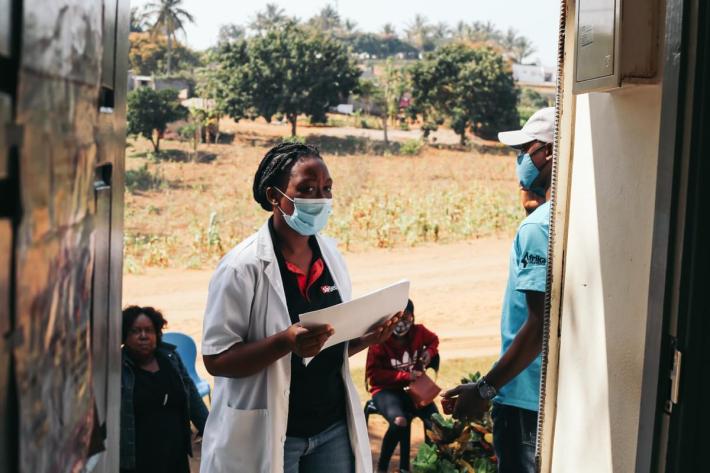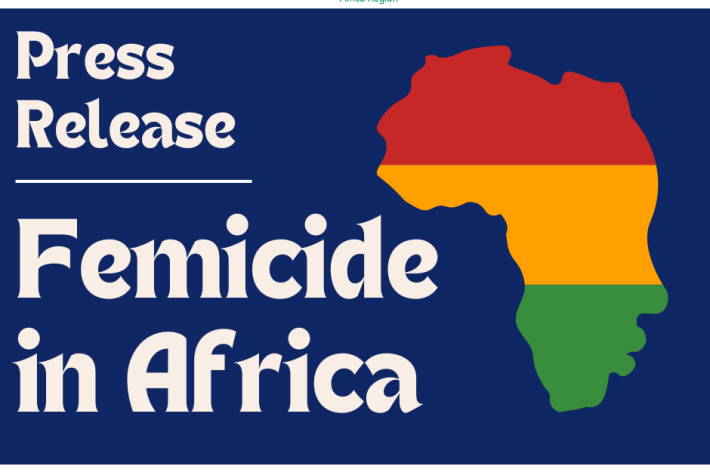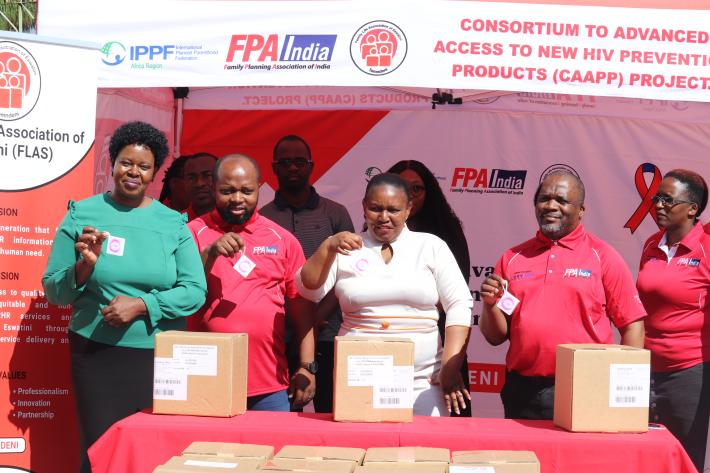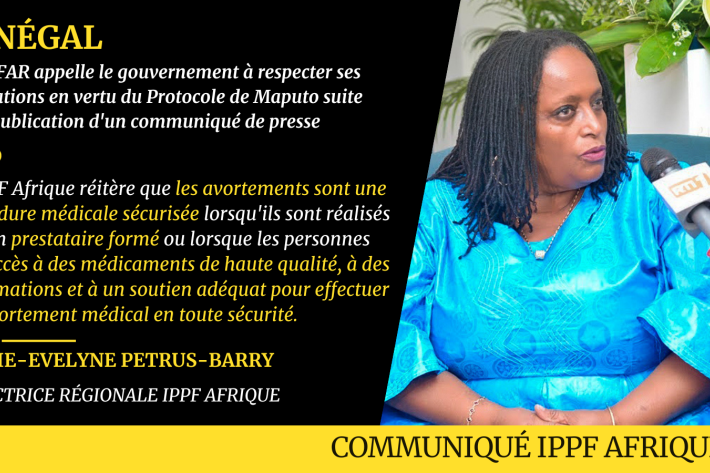Latest press releases
A selection of stories from across the Federation
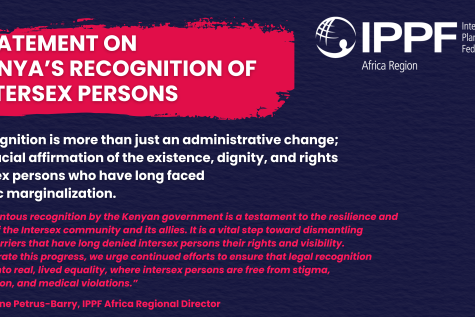
Kenya
IPPF Africa Region Welcomes Kenya’s Landmark Recognition of Intersex Persons
IPPF Africa Region Welcomes Kenya’s Landmark Recognition of Intersex Persons Nairobi, Kenya: 13 February 2025 – On 31 January 2025, Kenya has taken a groundbreaking step towards inclusivity and human rights by officially recognizing intersex as a sex marker alongside male and female in the Kenya Legal Notice 153 of 2025.


| 28 July 2022
World Population Day 2021: Increasing Effective Strategies for SRHR Information and Services (Focus on Malawi)
Sunday, 11 July 2021. As we commemorate the World Population Day with a projected 7.9 billion people on the planet today, our thoughts also turn to what were the reproductive needs and wants of women and girls in Africa during this extraordinary year and whether were they fulfilled. The COVID-19 pandemic has had devastating effects on the provision of health care services, including sexual and reproductive health (SRH) services, often more so in countries in Africa that are already struggling to keep up with normal preventative and curative services, let alone COVID-19 related morbidity and mortality. While fertility rates across the globe are shifting in both directions, and with Africa accounting for the top 23 highest total fertility rates (TFR)[1] in the world, the IPPF Women’s Integrated Sexual Health project (WISH2) provides SRH care to women, men and young people in 15 countries across the world - 12 of them being in Africa, including in fragile and conflict affected countries. The WISH2 program offers quality integrated and inclusive family planning and SRH services to marginalized and hard to reach populations: the poor, youth under 20 years and people living with disability. Within this framework, the WISH2 project recognized that many of these countries’ health services have been devastatingly affected by waves of the pandemic and adapted SRH services to ensure, wherever possible, continued access to SRH care to support women to achieve their reproductive intentions during the pandemic. In Malawi, we can focus in on young people against the backdrop of COVID-19 and a health system struggling to cope. Youth in Malawi face a myriad of challenges such as early marriages, unintended pregnancies, unsafe abortions, high new HIV infections, early childbearing, drug and alcohol abuse, high illiteracy rate, poverty, and HIV and AIDS pandemic. (NSRHR Policy 2017–2022). While young people make up the largest and fastest growing proportion of population in Malawi with 51% of the population below 18 years, access to SRH care remains low among Malawian youth with 41% of adolescent women aged 15–19 having an unmet need for modern contraception. A Family Planning training in Lilongwe, Malawi, by Family Planning Association of Malawi (FPAM). As the world celebrates population day, the Family Planning Association of Malawi (FPAM), which is IPPF's Member Association in the country, has increased effective strategies for providing access to information and SRH care to youth, including persons living with disabilities throughout the pandemic in the country. Some of these strategies include; Training of youth leaders to conduct peer learning programs and training of health care providers in Youth friendly services. Establishing youth friendly spaces at service delivery points. Conducting awareness creation and demand for SRH services to youth including conducting dialogue sessions, and engaging on WhatsApp and other social media platforms like Facebook. Sensitizing parents and guardians to create an enabling environment for youth to access SRH services. Coordinating with the Malawi Council for people with disabilities (MACOHA) - a government agency - to increase access to SRHR for persons with disabilities. Community Reproductive Health Promoters sensitization on engaging with young people with disabilities in the community. Use of the growing mobile phone market in Malawi as a new avenue for reaching young clients by working with a local mobile service operator to promote SRHR messaging on the 3-2-1 platform (a free to use mobile subscription app). These strategies can be found in full here. “Our work complements Government efforts. Through the WISH project and other projects, FPAM has been able to reach out to young women particularly in the hard-to-reach areas with SRH information and services which otherwise could not be available if FPAM was not present in those areas”, said Donald Makwakwa, Executive Director at the Family Planning Association of Malawi. A community training activity by FPAM. In this coming year, despite reduced funding, the project will aim to continue maintaining its innovative adaptations to support access to quality SRH services and rights for women and men living in the most difficult of circumstances. Joyce Ayong, IPPF Board of Trustee member and President of the Youth Action Movement (YAM) at the Cameroon National Planning Association for Family Welfare (CAMNAFAW) highlighted the importance of youth outreach and inclusion especially in the most difficult of circumstances. “We campaign for the cause of young people so that they are taken into account. Young persons with disabilities and youth living in hard to reach areas also need to access SRH care and information and it is our duty to continue to find ways to provide these lifesaving services to them”, said Ayong. The WISH2 program will continue to find adaptive strategies ensuring that the much-needed SRH care in some of the hardest hit countries by the pandemic is delivered to the most marginalized, leaving no one behind when it comes to family planning needs. About the Women’s Integrated Sexual Health Project 2 The Women’s Integrated Sexual Health (WISH) programme offers quality integrated and inclusive family planning and sexual and reproductive health services to marginalized and hard to reach populations: the poor, youth under 20 years and people living with disability. WISH is the UK Government’s flagship programme to support integrated sexual and reproductive health and rights (SRHR) services in a range of countries across Africa and Asia by 2021. The International Planned Parenthood Federation (IPPF) manages the WISH programme through a consortium arrangement (Lot 2) with 10 IPPF Member Associations and hand - picked partners chosen for their expertise to maximise access and reach for people in 15 countries: Development Media International (DMI), Humanity and Inclusion UK (HI), International Rescue Committee (IRC), Marie Stopes International (MSI), and Options Consultancy Services (Options). The countries are: Afghanistan, Bangladesh, Burundi, Ethiopia, Madagascar, Malawi, Mozambique, Pakistan, Somalia, South Sudan, Sudan, Tanzania, Uganda, Zambia, Zimbabwe. For more updates on our work, follow IPPF Africa Region on Facebook, Twitter, Instagram and You Tube. [1] Total Fertility Rate 2021 (worldpopulationreview.com)
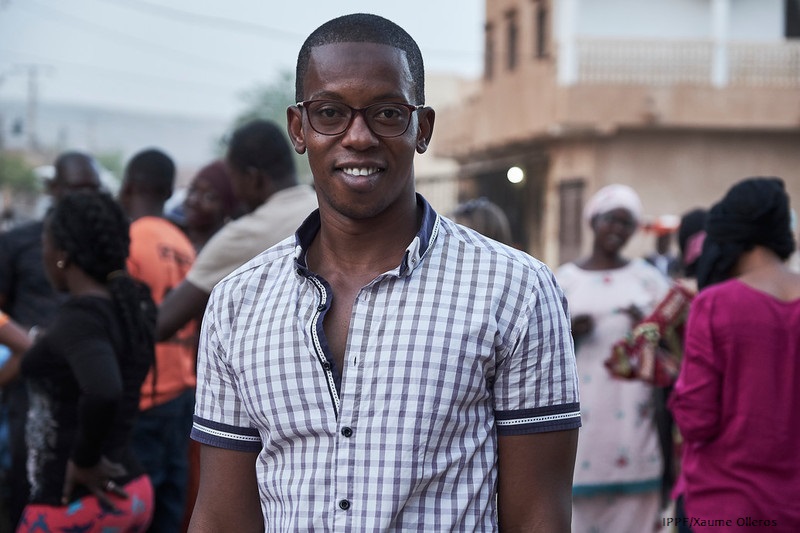
| 28 July 2022
IPPFAR Celebrates International Youth Day 2021: “Transforming Food Systems: Youth Innovation for Human and Planetary Health”
Addis Ababa, 12 August 2021 – In commemoration of the International Youth Day, The International Planned Parenthood Federation Africa Region, through its Sub-Office to the African Union and the United Nations Economic Commission for Africa hosted a virtual panel discussion on Youth, Gender Equality and Sexual Reproductive Health Rights in Transforming African Food Systems on 12 August 2021. The virtual panel discussion focused on the role of youth in advocacy towards gender equality and sustainable healthy food systems. The event also aimed at sharing recommendations to support young people's meaningful engagement in advocacy on inclusive food systems for the realization of sexual reproductive health rights on the African continent. Africa has the youngest population in the world with more than 400 million people between the ages of 15 and 35 years, which requires increased investment in economic and social development factors to improve the Development Index of its countries. This year’s International Youth Day, celebrated under the theme: “Transforming Food Systems: Youth Innovation for Human and Planetary Health”, offers an opportunity to reflect on the interlinkages between sexual reproductive health and rights and nutrition, and on the intersectional aspects of food systems in the context of gender. “The International Youth Day helps bring attention to our issues. Young people are increasingly interested in sexual reproductive health and rights and understand, now more than ever, the importance of sexual health knowledge”, said Ms. Rosa Ayong, moderator of the panel discussion and a youth member of the IPPF Global Board of Trustees. The virtual round table panelists included Mr. Kassoum Coulibaly, President of the Global Institute for Women’s Empowerment Group, who spoke about the role of young people in promoting an inclusive food system. ‘’The International Youth Day, is a moment to evaluate our progress, empower young girls and boys, and strengthen their leadership role in the world's transformation with a gender equality vision," said Mr. Coulibaly. Panelists also included Ms. Chantal Umuhoza, who addressed the intersectional aspects of food systems in the context of gender and age, and Mr. Joshua Atabinore Akharigeya, who highlighted the impact of sexual reproductive health and rights on the food value chain from production to marketing. “Discussing Sexual and Reproductive Health and Rights within the context of food value chain is ever critical. A healthy community ensures productivity and success across the food value chain, and in return, individuals and communities are economically empowered to access quality sexual reproductive health and rights services, seek justice and reduce their vulnerabilities - especially for girls and women - against sexual and gender-based violence”, said Mr. Akharigeya. Keynote speaker and Deputy Director of the UN World Food Program African Union Global Office, Ms. Magdalena Moshi, said that “actions should be taken by all stakeholders, to promote and advocate for the consumption of wholesome, nutrient dense foods for the realisation of sexual reproductive health, particularly for the female youth, as consumers". The discussions enabled youth participants to learn about their role in promoting an inclusive food system by advocating for sexual health rights through regional advocacy policies and frameworks. Giving youth a voice is a prerequisite for Africa’s transformation. Expanding opportunities for youth, women, and girls is an obligation that is essential in realizing everyone’s right to food security, nutrition, and sexual reproductive health. END Media Contacts: -Mahmoud Garga, Lead Specialist - Strategic Communication, Media Relations and Digital Campaigning, IPPF Africa Regional Office (IPPFARO) – email: [email protected] -Phone +254 704 626 920 Maryanne Wanyama, Communications Office, IPPFARO, Nairobi (Kenya) - Email: [email protected] – Phone: +254 707 952 990 ABOUT IPPF AFRICA REGION (IPPFAR) The International Planned Parenthood Federation Africa Region (IPPFAR) is the leading sexual and reproductive health (SRH) service delivery organization in Africa, and the leading sexual and reproductive health and rights (SRHR) advocacy voice in the region. Headquartered in Nairobi, Kenya, the overarching goal of IPPFAR is to increase access to SRHR services to the most vulnerable youth, men and women in sub-Saharan Africa. Supported by thousands of volunteers, IPPFAR tackles the continent’s growing SRHR challenges through a network of Member Associations (MAs) in 39 countries. We do this by developing our MAs into efficient entities with the capacity to deliver and sustain high quality, youth focused and gender sensitive services. We work with governments, the African Union, Regional Economic Commissions, the Pan-African Parliament, United Nations bodies among others to expand political and financial commitments to sexual and reproductive health and rights in Africa. Learn more about us on our website. Follow us on Facebook, Twitter, Instagram and You Tube.

| 28 July 2022
Support Statement - 4th SDGs Youth Summit- Media Launch and stakeholders' forum - 28 October 2021
Sam Ntelamo, Head of IPPFAR Sub Office to the African Union and ECA Support Statement - 4th SDGs Youth Summit- Media Launch and stakeholders' forum - 28 October 2021 Minister, Federal Democratic Republic of Ethiopia Planning and Development Commission. UN Resident Coordinator, Ethiopia UN Resident Coordinator, Ghana Director, Technology, Climate Change, and Natural Resource Management Division, UN Association of Ethiopia The Youth Summit Team, Youth Advocates for Ghana Distinguish participants, and guests Allow me to begin by extending my warm appreciation to everyone from the Youth Advocates Ghana and all stakeholders, who have been working on the preparation of the 4th SDGs Youth Summit., IPPFAR supports this process which ensures to engage more young people in the achievement of Sustainable Development Goals (SDGs). As you all know, the 2030 Agenda is an important political consensus document declaring UN Member States’ intent to work collectively towards achieving people-centered sustainable development. It includes many commitments about gender equality and women’s and girls’ empowerment, and sexual and reproductive health and reproductive rights. Both goals on health (SDG 3) and gender equality and women’s and girls’ empowerment (SDG 5) include targets relating to sexual and reproductive health and reproductive rights. Equally, the Agenda 2063 is another guiding framework to African Union Member States, Civil society, and everyone else. It is an important guiding document that will help to achieve the Africa we want, and to achieve the African Development objectives through its Aspiration 6: which calls for: An Africa, whose development is people-driven, relying on the potential of African people, especially its women and youth, and caring for children. We implore on African countries to take advantage of the opportunities presented by the SDGs in building economies that can sustain their development aspirations. This agenda identifies areas the need to strengthen capacity and capacity-enabling approaches for a range of stakeholders, including international partners. It offers policymakers a new approach to development — one that puts Africans in the driver's seat. If well implemented, the SGDs have the potential to improve people's lives in ways that are consistent with the African Union vision of an Africa capable of achieving its development. IPPF reaffirms its commitment to support the successful attainment of the goals, particularly those related SRHR and gender equality among the targets. Through our Member Associations regionally, we are now more than ever, focused on ensuring that governments make good on their commitments and implement the targets to improve the livelohoods of the citizens. In supporting our Member Associations work, we have produced a range of guides and information sheets to popularize the SDGs and how they can use them to make a change. In conclusion, I fully support the efforts of Youth Advocates Ghana and all partners, and stakeholders as they seek external support in their quest to raise young people voices through platforms like these, which provides space for them to discuss their Health and Well-being, human rights, sexual reproductive health rights, and education and their rights to have a good future with dignity, respect, and inclusivity without leaving NO ONE BEHIND. The media Launch is only a first step towards the main event of the Summit which will host African Youth to share their perspectives and to exchange their experiences, and concerns when it comes to the SDGs goals achievement with policymakers and leaders. I wish all the best for all the team, and in the end. I thank you.

| 28 July 2022
African Girls Summit 2021: IPPF reaffirms its commitment to eliminate all forms of violence against women and girls
Organised by the African Union Commission, the African Girls' Summit aims to accelerate the realisation of girls' rights, including the elimination of harmful practices such as female genital mutilation, early marriage, and breast-bandaging, as well as their rights to education and sexual and reproductive health. This is the third summit under this theme, the first edition having been held in Lusaka, Zambia from 26 to 27 November 2015, and the 2nd summit in Accra, Ghana from 21 to 24 November 2018. During the opening ceremony, the Representative of the UN Secretary-General's Special Envoy on Violence against Children, Ms. Najat Maalla M'Jid, shared a strong message: "We must keep in mind that Africa's children and youth are Africa's capital, Africa's richest source of wealth, with a population that is growing and is expected to reach 830 million by 2050". In his speech, Niger’s Head of State, Mr. Mohamed Bazoum, said that the theme of the summit confirms "the commitment of African countries to work together for human development on the continent by relying in particular on women and youth.” According to him, "We have, through this meeting, the opportunity to analyse, monitor and better guide the actions of our States in terms of protection of the human rights of girls who constitute an important part of the population of our countries.” IPPF participated through the intervention of its African Regional Director, Ms. Marie-Evelyne Pétrus-Barry, during two panels, respectively on the themes: "The impact of COVID-19 on women and girls: an integrated response" and "Young people engage with Member States to end harmful practices". During these exchanges, the Regional Director reaffirmed "IPPF's commitment to eliminate all forms of violence against women and girls, to protect their rights and to ensure the provision of and access to the services and information necessary to protect their health and well-being". She stressed the devastating impact of harmful practices on women's and girls' sexual and reproductive health, as well as their mental and psychosocial health: "Female genital mutilation and child marriage are both linked to high rates of maternal mortality and low use of family planning leading to unwanted pregnancies. They deprive women of the opportunity to be educated, to become imaginative, innovative and creative, to open up to new possibilities, and to enjoy the full benefits of decent work for themselves and their families.” She also noted the work of its Member Associations in being innovative and resilient to the challenges of COVID-19. "They have, among other things, simultaneously developed telemedicine, door-to-door and their mobile clinics to meet the SRH needs of confined women, digitised sex education for young people deprived of school, etc." She also celebrated the work of young people and thanked them for their actions in promoting sexual and reproductive rights on the continent: "Thank you young women and men, thank you for all you are doing today, and for the many things you will still accomplish. I have great admiration for you, and I think I speak for many people of my age when I say that we admire you and are ready to learn from you.” It is IPPF's duty to support young people, especially young women and girls, and to give them all the support they need to realize and implement their collective commitments to sexual and reproductive rights. IPPF is, and will remain, at their side.

| 28 July 2022
Africa Day Message 2021 from IPPF Africa Region
Today, IPPF Africa Region joins fellow pan-Africans in celebrating the ‘Africa Day’. This is a day marked on 25 May each year to commemorate the founding of the Organization of African Unity (OAU), which later became the African Union. The day provides an opportunity to recite the political and socio-economic achievements of African governments and African citizens. This year’s theme is dubbed: Arts, Culture and Heritage: Levers for Building the Africa We Want. According to the African Union, ‘The purpose of commemorating Africa Day with the youths is to serve as a platform for showcasing Africa’s talent through the arts, culture, heritage, innovation and entrepreneurship, while at the same time making available the space for networking among the youths and invited stakeholders.’ The IPPF Africa Region has a vibrant youth volunteer network known as the Youth Action Movement (YAM), whose activities include creating awareness on sexual reproductive health rights (SRHR) information and services to their peers. Among the key approaches they use to do so is through music, art, song, dance, poetry, skits and other such performances, which are popular among young people. The YAM members creatively blend in SRHR messages within their performances, which help their peers easily understand important information being shared. Often, this leads to an uptake in young people’s access to youth-friendly centers in the IPPF Member Associations in their countries, from where they get more information and services pertaining to their sexual and reproductive health. Notably, this year’s commemoration, just like last year, comes amidst the unprecedented COVID-19 pandemic, and which has led to loss of lives over the world, including in Africa. However, unlike last year, this year’s Africa Day celebrations come at a time when there is hope, owing to the COVID-19 vaccine, which is purposed to significantly reduce people’s adverse effects to coronavirus. Many African governments have demonstrated great efforts in ensuring as many of their citizens receive the COVID-19 vaccine. On this day, we celebrate the various strides that African governments have made in developing and implementing policies geared towards the improvement of the livelihoods, health and well-being of the African people. For more information about the work of IPPF Africa Region, connect with us on Facebook and Twitter.

| 28 July 2022
IPPF Welcomes President Biden’s Decision to Repeal the Global Gag Rule
The International Planned Parenthood Federation (IPPF) welcomes the news of President Biden’s decision to keep his promise and repeal the harmful Global Gag Rule (GGR) - also known as the Mexico City Policy. Since its expanded reintroduction in 2017 by the previous administration, the Global Gag Rule has contributed to an increase in unintended and high-risk pregnancies, unsafe abortions – culminating in unnecessary maternal deaths. For IPPF, 53 healthcare projects in 32 countries were impacted by GGR, with some Member Associations losing up to 60% of their funding. IPPF’s Director-General, Dr Alvaro Bermejo said: “I welcome the decision by President Biden to repeal the Global Gag Rule. The expanded reintroduction of the gag was callously designed to deny women the right to decide what happens to their body. Whilst we know this policy is intended as a tool to attack abortion care by the anti-choice movement, not only has it led to reproductive coercion, it has cut deeper into healthcare provision: from HIV prevention programs to maternal health to contraceptive access – no one was spared the fallout of this policy. “What lies ahead of us is years of work to undo the harm caused by Global Gag Rule, and to build back a better and stronger relationship with the U.S. – one where our work is not under threat from future anti-sexual and reproductive health administrations. To protect the rights of future generations of women and girls, we ask that the Biden-Harris administration take the necessary steps to permanently repeal the Global Gag Rule. Without a permanent repeal, the global gag remains a constant threat to women, girls, youth and marginalized communities. Reproductive rights, bodily autonomy and the human right to decide what happens to your body cannot be at the mercy of a pen stroke. “IPPF looks on with hope and welcomes the opportunity to work closely with the Biden-Harris administration to protect and advance sexual and reproductive healthcare for all.” And President and CEO, Planned Parenthood Federation of America, Alexis McGill Johnson said: “Over the past four years, the United States didn’t just fail to support global reproductive health care access — it actively blocked it. Today, we applaud the beginning of a new chapter, as the Biden-Harris administration puts an end to the devastating global gag rule, which has prevented millions of people around the world from receiving essential health care. We look forward to working alongside the administration and Congress to pass the Global HER Act, to permanently protect access to sexual and reproductive health care across the globe from changes in White House political control. It is long past time that the United States proudly declares to the world that reproductive rights are human rights.” IPPF would like to thank the international community who stepped in and stepped up to help fill the funding gap that was left by the Global Gag Rule. Together, we will continue to fight and deliver sexual and reproductive health and rights.
Pagination
- First page
- Previous page
- …
- 7
- 8
- 9
- …
- Next page
- Last page











